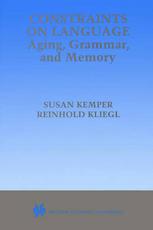

Most ebook files are in PDF format, so you can easily read them using various software such as Foxit Reader or directly on the Google Chrome browser.
Some ebook files are released by publishers in other formats such as .awz, .mobi, .epub, .fb2, etc. You may need to install specific software to read these formats on mobile/PC, such as Calibre.
Please read the tutorial at this link: https://ebookbell.com/faq
We offer FREE conversion to the popular formats you request; however, this may take some time. Therefore, right after payment, please email us, and we will try to provide the service as quickly as possible.
For some exceptional file formats or broken links (if any), please refrain from opening any disputes. Instead, email us first, and we will try to assist within a maximum of 6 hours.
EbookBell Team

0.0
0 reviewsSusan Kemper A debate about the role of working memory in language processing has become center-most in psycholinguistics (Caplan & Waters, in press; Just & Carpenter, 1992; Just, Carpenter, & Keller, 1996; Waters & Caplan, 1996). This debate concerns which aspects of language processing are vulnerable to working memory limitations, how working memory is best measured, and whether compensatory processes can offset working memory limitations. Age-comparative studies are particularly relevant to this debate for several reasons: difficulties with language and communication are frequently mentioned by older adults and signal the onset of Alzheimer's dementia and other pathologies associated with age; older adults commonly experience working memory limitations that affect their ability to perform everyday activities; the rapid aging of the United States population has forced psychologists and gerontologists to examine the effects of aging on cognition, drawing many investigators to the study of cognitive aging. Older adults constitute ideal population for studying how working memory limitations affect cognitive performance, particularly language and communication. Age-comparative studies of cognitive processes have advanced our understanding of the temporal dynamics of cognition as well as the working memory demands of many types of tasks (Kliegl, Mayr, & Krampe, 1994; Mayr & Kliegl, 1993). The research findings reviewed in this volume have clear implications - for addressing the practical problems of older adults as consumers of leisure ti- reading, radio and television broadcasts, as targets of medical, legal, and financial documents, and as participants in a web of service agencies and volunteer activities.